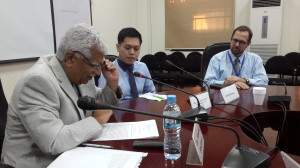
SHARI’ATIZATION OF ISLAM IN THE POST-SECULAR WORLD
Seminar
Past Event
Dr. Azmi Mohammad – Lecturer Department of Islamic Studies University of Brunei
FCC Lahore
Upcoming Event
The Centre for Public Policy and Governance (CPPG)
cordially invites you
to
a Seminar
on
“SHARI’ATIZATION OF ISLAM IN THE POST-SECULAR WORLD”
on
Thursday, October 27, 2016 at 4 pm
Venue: Rt. Rev. Alexander John Malik Public Policy seminar room E-002
Guest Speaker: Dr. Azmi Mohammad – Lecturer Department of Islamic Studies University of Brunei
Abstract
The resurgence of Muslim fundamentalism in the recent decades has accentuated a power struggle between secularism and political Islam on the global scene. Bassam Tibi, a German-Syrian scholar who writes on the tensions between Islam and modernity, cautions the rise of Islamism as a threat to the universal values of humanity due to its propagation of a “neo-Shari’a” – a reinvented Shari’a that is tendentiously established as a Divine law in order to legitimize a totalitarian legal system, which allows the arbitrary exercise of politics in the guise of restoring Islam to its primordial purity. I describe this phenomenon as “Shari’atization of Islam”, and argue that the Muslim persistence in seeing the human-interpreted Shari’a as an immutable law that determines reality prevents them from coping with modernity and isolates them from the rest of the humanity. I will attempt to deconstruct the thinking on “Shari’atization of Islam” and the ways in
which this phenomenon is believed to affect both the Muslim world and the international scene, highlighting its strengths and weaknesses in the context of the diverse spectrum of contemporary Islamic thought. Contrary to seeing the Shari’a as strictly mutable or strictly immutable, my talk explores contemporary Muslim attempts at describing it as both mutable and immutable where it matters and generalizing it as “a way of life” in order to pave the way for a modern Muslim understanding of the Qur’anic stance on peaceful co-existence in a shared universe.


